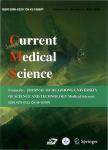Splenectomy Attenuates Severe Thermal Trauma-induced Intestinal Barrier Breakdown in Rats
Splenectomy Attenuates Severe Thermal Trauma-induced Intestinal Barrier Breakdown in Rats作者机构:Department of Plastic Surgery Shanghai Sixth People's Hospital Affiliated to Shanghai Jiaotong University Department of General Surgery Union Hospital Tongji Medical College Huazhong University of Science and Technology
出 版 物:《Journal of Huazhong University of Science and Technology(Medical Sciences)》 (华中科技大学学报(医学英德文版))
年 卷 期:2015年第35卷第6期
页 面:868-873页
核心收录:
学科分类:1002[医学-临床医学] 100210[医学-外科学(含:普外、骨外、泌尿外、胸心外、神外、整形、烧伤、野战外)] 10[医学]
基 金:supported by the Natural Science Foundation of Hubei Province(No.2010CDBO7804)
主 题:burn splenectomy endotoxin nuclear factor-κB tumor necrosis factor-alpha zonula oc-cludens protein- 1 occludin
摘 要:Summary: The severe local thermal trauma activates a number of systemic inflammatory mediators, such as TNF-α, NF-κB, resulting in a disruption of gut barrier. The gastrointestinal tight junction (T J) is highly regulated by membrane-associated proteins including zonula occludens protein-1 (ZO-1) and oc- cludin, which can be modulated by inflammatory cytokines. As splenectomy has been shown to reduce secretion of cytokines, we hypothesized that (1) severe scald injury up-regulates TNF-α and NF-κB, meanwhile down-regulates expression of ZO-1 and occludin, leading to the increased intestinal perme- ability, and (2) splenectomy can prevent the burn-induced decrease in ZO-1 and occludin expression, resulting in improved intestinal barrier. Wistar rats undergoing a 30% total body surface area (TBSA) thermal trauma were randomized to receive an accessorial splenectomy meanwhile or not. Intestinal in- jury was assessed by histological morphological analysis, and serum endotoxin levels, TNF-α, NF-κB, ZO-1 and occludin levels were detected by Western blotting in the terminal ileum mucosal tissue. 30% TBSA bum caused a significant increase in serum endotoxin levels, but NF-κB, and TNF-α, and the av- erage intestinal villus height and mucosal thickness were decreased significantly. Burn injury could also markedly decrease the levels of ZO-1 and occludin in terminal ileum mucosal tissue (all P〈0.01). Sple- nectomy at 7th day after burn significantly reversed the bum-induced breakdown of ZO-1 and occludin (all P〈0.01). The results of this study suggest that severe thermal injury damages the intestinal mucosal barrier. Splenectomy may provide a therapeutic benefit in restoring bum-induced intestinal barrier by decreasing the release of inflammatory cytokines and recovering TJ proteins.



